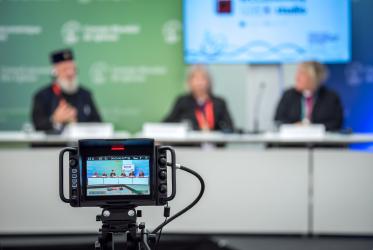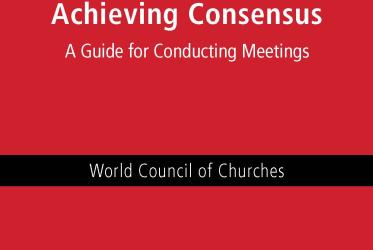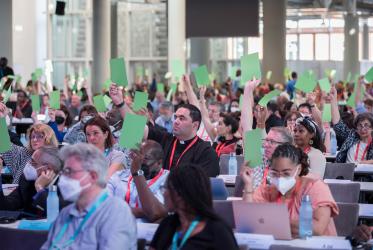A comprehensive report of the programmatic work undertaken by the
Council between Harare and Porto Alegre will be considered by the Central
Committee members at their February 2005 meeting. The present report will
comment only on the major highlights that have marked the year in review.
In addition, a number of activities have
been implemented within each programmatic area, in accordance with the plans
laid out for the triennial period 2002-
2005. Inmost cases, these activities
are part of processes that will be finalized before the 9thAssembly.
1.
As we approach the mid-term of theDecade to Overcome Violence(DOV),
the process of
ownership by churches from all over the world is becoming more obvious. A sign
of this is the growing number of visitors to the WCC-DOV web site (an average of
40,000 visits per month in 2004).
Two outstanding achievements should be highlighted:
§
The Annual Focus on the USA, under the
theme"The Power and Promise of
Peace",generated a great number of activities all over the country. The US
DOV Committee, together with the WCC US office, provided a remarkable leadership
role, both in providing the content and helping to mobilize churches and the
larger constituency. The campaign culminated at the US Conference Annual meeting
in Atlanta, Georgia, in October. Attention was drawn to US churches'
responsibility for peace and justice and participants were moved by the messages
of solidarity and the challenges brought by a group of eight "living letters"
from different continents. This gathering provided an opportunity to strengthen
relationships with the Historic Black Churches.
§
For the first time, the WCC invited the
churches from around the world to mark the 21st
September, as theInternational Day of Prayer for Peacechosen by the UN in 1981.Messages
from 14 world Christian leaders and peace-makers were filmed and shown in
different parts of the world, including during a celebration at the Ecumenical
Center in Geneva. These messages were also posted on the WCC web site which
received an unprecedented number of visits (250,000) during the month of
September.
In 2005, the annual focus will be onAsiaunder the theme "Building
Communities of Peace for All", which is also the theme of the 7thAssembly of the Christian Conference of Asia.
After
the tsunami tragedy which brought death and suffering to so many communities in
Asia, the annual focus should become a powerful symbol of the reality of a
fellowship of solidarity and hope, raising the awareness of our common
vulnerability and common responsibility to one another and to our planet
earth.
2.
The central task ofStrengthening the One Ecumenical
Movementhas been marked by a series of initiatives, of which the
following should be highlighted :
§
An intensive programme ofvisitsto churches by the General
Secretary during his first year of service (15 visits to 6 continents),
carefully prepared in cooperation with staff responsible for the programmatic
content and the communication aspect.
§
The completion of a series ofencounterswith different constituencies
of the ecumenical movement, in particular:
-
The Joint Working Group with the Roman
Catholic Church which held its last Plenary session in May 2004 and concluded
the seven years mandate of the Group by adopting a report that was sent for
information to the Central Committee and that will be presented at the
9thAssembly;
-
The Global Christian Forum which initiated
in Asia, in May 2004, the first of a series of four consultations planned in
major regions that will lead up to a Global Christian Forum meeting in
2007;
-
The Joint Consultative Group between the
WCC and Pentecostals which held its fifth annual meeting in South Africa in
September and prepared a report to be submitted to the Assembly.
§
The landmarkConsultation on Ecumenism in the
21stCentury,organized near Geneva (30 November - 03 December
2004)
brought together more than
100 participants from WCC member churches, from Catholic and Pentecostal
churches as well as from Christian World Communions, regional and national
ecumenical organizations, international ecumenical institutions and
church-related agencies. During three intensive days of dialogue the
participants shared their visions of ecumenism and looked at more effective ways
to work together in today's rapidly changing ecclesial, economic and political
contexts. There was a compelling call for a transformation of the ecumenical
movement from the narrow confines of its institutions from the participants who
stated that the challenges are many, and do not concern only the WCC. The report
and its recommendations will be shared with the Central Committee members and a
follow-up process has been designed to continue the reflection.
3.
Two outstanding contributions toBuilding the Unity of the Churchcan
be highlighted:
§
TheFaith and Order Plenary Commission
Meetingin Kuala Lumpur (26 July - 06 August 2004) ended with a message of
hope. After thorough reflections on the reports of the studies mandated by the
Faith and Order Commission, the participants concluded "there are still many
questions we need to explore, but we became aware of reaching a moment of hope,
having identified a framework which might enable churches to move forward in
terms of mutual recognition". The study on theNature and Mission of the Churchin
particular was considered as a major ecumenical tool for the 21stcentury.
§
The
Week of Prayer for Christian
Unity2005 will mark the beginning of a new era of
collaboration between the WCC and the
Roman Catholic Church as, for the first time, the text was not only jointly
prepared but also jointly published by the WCC Faith and Order Commission and
the Pontifical Council for Christian Unity.
4.
Promoting the Ministry of
Reconciliation
is the underlying thread
interweaving the activities of the programme on Mission and Evangelism in the
preparation for the World Mission Conference to be held in Athens in May
2005.
The following activities
should be highlighted:
§
Life stories and theological reflections
on core questions related to mission, evangelism, healing and reconciliation
were shared at various meetings. The URM intercontinental Consultation held in
Ghana in June 2004 under the theme "Mission from the perspective of people in
struggle" emphasized the need for an understanding and practice of mission with
the poor, involving the church and transforming its mission, as well as going
beyond the church into diverse religious and social confines. Similarly, the
world conference theme was subject to reflection from various perspectives and
contexts at the Zambia Conference on Mission and Development, the school of
Evangelism for the Pacific held in Fiji, the Afro-Asian mission consultation
held in India on healing, reconciliation and power. To foster church reflection
and action on their healing ministry, in particular in relation to the HIV/AIDS
pandemic, a series of consultations was organized in all regions. Several
theological and spiritual documents were published in the International Review
of Mission and in book form.
§
Two
statements
were prepared to summarize new insights
in theology and mission: one on mission from the perspective of the message of
reconciliation, the other on the intrinsic relation between the healing mandate
of the church and its missionary calling.
§
Majornetworking and advocacy workwas
developed in relation to HIV/AIDS in close cooperation with the Ecumenical
Advocacy Alliance, such as the support for the Code of Good Practice for
HIV/AIDS and the active contribution at the 15thInternational AIDS
Conference in Bangkok where faith-based organizations made their voices heard in
an unprecedented manner.
5.
The Ecumenical Initiative
on HIV/AIDS in Africa
,
with its dedicated team of consultants
based in Africa and coordinated from Geneva, continued to develop its activities
in the form of consultations, workshops, training events and publications all
over the continent. In view of the fact that there are still too many church
leaders who remain silent or stigmatizing in front of the epidemic, much
emphasis is put on approaching present and future church leadership through
seminars with theologians to "read the Bible in times of HIV" and on bringing
the issues at stake into the curricula of theological training institutions. In
2004 aprocess was started to bring this theological approach at a congregational
level, in particular through materials for Sunday schools and appropriate
liturgies. For
2005
acommon Activity Plan on HIV/AIDS work was set up between
WCC-EHAIA and AACC.
6.
The Challenge of Ecumenical
Formation
is perceived even more acutely in the
framework of the reflection process on the Ecumenism in the 21stCentury. Three main developments can be highlighted:
§
Thelearning resource materialproduced in
the form of study guides and CD-ROM
try to model approaches that go beyond transmitting information and that
are appropriate for different regional contexts. Training seminars were
organized for staff of the WCC and of church-related agencies. Following a
recommendation from the WCC Round Table Meeting, a four-day training seminar was
offered to some 30 staff members of specialized
ministries in December 2004. Modalities
for interfaith education are being studied.
§
The strategy of appointing regional
consultants for Asia/Pacific, Central and Eastern Europe and Latin
America/Caribbean is proving to be effective forEcumenical Theological Educationthat
requires contextual approaches. Examples include the HIV/AIDS theological
curriculum for Africa, which is now used as a model for other regions, and the
curriculum on disability, taking up the recent EDAN statement. Work continues to
help women have access to theological education and to encourage churches to
engage them.
§
New efforts are being developed to treatscholarshipsas a real opportunity
for ecumenical formation. A brochure was published and stories are being
collected to illustrate the benefit of this activity to churches, communities
and church related organizations. There continues to be a disproportionate lack
of funds for scholarships for theological studies. An external evaluation
of
the WCC Scholarships programme
will take place in 2005.
7.
The Ecumenical Institute of
Bossey
is a privileged place providing
ecumenical formation in an intercultural and ecumenical setting, through formal
courses offered to residential students and short term seminars on critical
issues.
§
The number of students registered at theGraduate schoolsessions is
increasing (30 for the semester 2003-2004, 38 for the semester 2004-2005).
The theme of the Graduate School for
this semester is "God's Power and Human Accountability". The year 2004 marked
the first year when the Bossey Institute was offering a Ph.D. in Ecumenics. The
students will soon be able to enjoy working at the new Library-Research Center
which
should open in the middle
of
2005.
§
A total of fiveseminarsbrought together a large number
of participants from the whole spectrum of the Christian family as well as from
other faith traditions. The seminars were organized in cooperation with WCC
staff and other ecumenical organizations.
8.
WCC is increasingly expected to provide
analysis, resources and guidance onInter-religious dialogueand
cooperation. Most of the programmes have integrated this dimension into their
activities. Among the many contributions to inter-religious dialogue the
following could be highlighted:
§
After a two-year study process involving
three networks and teams of Inter-religious Dialogue, Mission and Evangelism,
and Faith and Order, a study document on a theological approach to"Religious Plurality and Christian Self
Understanding"was produced and should serve as a background document for
the Plenary on the same theme at the Porto Alegre Assembly.
§
The 6thVisser 't Hooft
Memorial Consultationon "Religion, Power
and Violence"was held in Bossey in June. Participants from various faith
traditions identified models, resources and networks for inter-religious
peace-building. They stressed the need to move beyond analysis and to develop
coalition for peace at grass-root levels and to share liturgies and resources
for peace.
§
A multifaith consultation, jointly
prepared by the WCC and the Pontifical Council for Inter-religious Dialogue on
theContribution of Africa to religious
and spiritual lifewas organized in Ethiopia in September. A publication is
underway.
§
A planning group involving
partners from other religions started to
prepare for the WCC
inter-religious
conference scheduled for June 2005 . Under the title"A critical moment in Inter-religious
Relations and Dialogue:thinking
together, assessing the present and imagining the future" this conference
should be a sign of both a renewed commitment to, and a change in
inter-religious dialogue.
§
The WCC and
the Inter-religious Platform in Geneva
are also planning another series of inter-religious events during a week-end in
Geneva in November 2005, to incite people, and particularly the young
generation, toLive Together in Religious
Plurality.
9.
A number of processes developed since the
last Assembly within the programme onEthics of Life, Alternatives to
Globalizationwere brought near to completion in view of the next
Assembly.
§
TheAGAPE Process(Alternatives to
Globalization Addressing People and Earth) culminated with a meeting to harvest
the findings of a regional process of consultations. A study document was
drafted and will serve as a background for the Assembly Plenary where a short
statement will be presented. The role of the WCC in promoting ecumenical
coordination at the World Social Forum was noticeable both in India in 2004 and
in Porto Alegre in 2005.
§
The signing of the Kyoto Protocol by
Russia was particularly welcomed by the WCC network onClimate Changewhich significantly
contributed to this achievement. The network started to broaden its cooperation
with other ecumenical partners, linking the work on Climate Change with the
commitment to ensure clean water for all.
§
Thedialogue with the World Bank and the
International Monetary Fundconcluded in October with a high level encounter
between the leadership of the WCC and of the two institutions, after a careful
preparatory process. The common commitment of all institutions to eradicate
poverty was affirmed, while many questions remain open on the meaning of
"development": priority on economic growth for the Bretton Woods institutions,
priority on ethical approaches for justice, human rights and equality for the
WCC. It is now proposed to continue to work jointly on country case-studies to
assess the impact of the WB and IMF programmes on people's lives.
§
Members of churches and organizations
working onracial justicereflected
on the theme "Living out the challenges of transformative justice" and made
proposals to bring these issues to the Assembly, at a time when racism continues
to be a challenge everywhere with exclusive migration policies, and increasing
trends of xenophobia and racist violence. The Resource Guide onTransformative Justice: Being Church and
Overcoming Racismwas published and widely distributed.
§
TheIndigenous People'sprogramme put
emphasis on the loss of land and resources and the loss of indigenous languages.
Moving the office to Bolivia has helped the work to be more focused on the daily
experience of indigenous people and of the churches in their local
context.
§
Women theologians from the USA and Canada
met with an internationally constituted steering group to continue the
reflection onWomen's Voices and Visions:
on Being Church.Attempts are being made to bring forward the ways churches
can respond to women's aspiration for community, justice and solidarity. Two
publications are underway.
§
A Global Church Campaign on Violence again
Women was launched by the WCC on November 25 and lasted until December 10.
Entitled"On the Wings of a Dove",this campaign focussed on the efforts made to overcoming violence against women
and children. Brochures, posters and an active web site were made available to
churches.
§
The statement prepared by EDAN (Ecumenical
Disabilities Advocate Network) and Faith and Order" Church for All"was translated and
widely distributed. The coordination of the EDAN network is housed in the AACC
building in Nairobi and plans are underway to make it a joint programme between
the WCC and AACC in 2005.
10.
The year 2004 provided ample reasons for promotingEcumenical Advocacy and Peaceful Resolutions of Conflictsat a global
level. Beside the various interventions recorded in the Public Issues report,
the following initiatives should be underlined:
§
TheWCC Advocacy Week at the UNwas
organized for the second time in New York in November. Some 80 participants from
churches and partners came together for a week of
mutual sharing and common strategizing.
Four public seminars were held in the UN building on the Millennium Development
Goals, Nuclear Proliferation, the UN Reform and the situation in
Sudan.
§
While the responsibility to monitor and
intervene in any conflict situation as needs arise remain, the CCIA Commission
identified the need for a more proactive role infour regional casesfor a time-defined
period leading up to the Assembly:
-
Israel-Palestine: Ecumenical Accompaniment
programme and ongoing efforts to establish a Jerusalem Ecumenical Center in the
old city.
-
Korea: Convening of carefully prepared
consultation on Peace and Reunification between North and South Korea in
Tozanzo, Japan, in October.
-
Zimbabwe: Close cooperation with the
Zimbabwe Council of Churhes which led to a strategic encounter in Geneva in
November between church leaders, specialized ministries' representatives and WCC
staff to assess the present situation and decide on future
cooperation.
-
Cuba: Process of preparation for an
international ecumenical delegation in 2005 to accompany churches in the actual
critical period.
§
In response to the increasing interaction
between religion and politics, a seminar was organised in December on "Spiritual
Accompaniment on Political Processes". A publication will follow.
11.
TheEcumenical Accompaniment Programme(EAPPI) is presently the most comprehensive ecumenical response to a conflict
situation. Since the programme was launched in August 2002 until the end of
2004, 168 ecumenical accompaniers, from more than 30 churches in 12 countries,
have served a minimum of three months with local churches, Palestinian and
Israeli NGOs as well as with local Palestinian communities. The work of the
accompaniers for justice and reconciliation between Christians, Muslims and Jews
and the WCC's role have been praised by a delegation of Jerusalem church leaders
who visited the places concerned in August.
12.
Staff of theDiakonia and Solidarityteam
coordinated some 54 round tables, convened regional group meetings in most of
the regions, and conducted capacity-building seminars in all regions.
Considerable progress was made in establishing church-based networks working on
children's issues in Asia.
Among the
many activities carried out in each region, the following initiatives should be
highlighted:
§
A review of thePacific Officewas carried out in July
in conjunction with a meeting of the Pacific church leaders.
It was noted that the office's presence
in the region had both positive and negative aspects, and it was recommended
that the possibility of returning the office to Geneva after the WCC and PCC
assemblies be considered by the next Central Committee. A review of the Middle
East Office will be carried out in 2005.
§
An external review of theMultilateral Sharing programmewas
completed during the year. It called for WCC to continue to play a role in
multilateral sharing but recommended that the work be refocused, that clear
criteria and terms of reference be developed and that relationships with the
funding partners be strengthened.
§
Work withuprooted peoplecontinue to be a high
priority, particularly as conditions affecting refugees, migrants and internally
displaced people worsened in most regions of the world. Regional working groups
meetings were held in most regions and the annual meeting of the Global Network
on Uprooted People took place in September with a particular focus on
gender-based violence and HIV/AIDS among refugees and migrants.
§
Cooperation with ACT is increasing.
Considerable time was spent in working on the implementation of ACT's new
membership policy to ensure that WCC member churches and related bodies register
their membership with ACT and that churches facing a disaster are able to access
necessary resources.
13.
Communication
A revised approach to information and communication had been
recommended by the Central Committee in order to strengthen the Council's
profile and visibility.
Arevised communication strategywas
discussed by the staff and the Communication Advisory Group, focussing on key
institutional messages, expansion of core audiences and a thorough
reorganisation and consolidation of the instruments and channels of
communication.
This revised strategy framework will be presented to the Programme
Committee in February 2005.
Among the many initiatives undertaken this year, two outstanding
productions should be highlighted:
§
The newWCC Annual Review 2003presenting the
WCC's work in a new and attractive format.
§
The long awaited publication of the third
volume of theHistory of the Ecumenical
Movementlaunched in December in presence of many of its authors.



